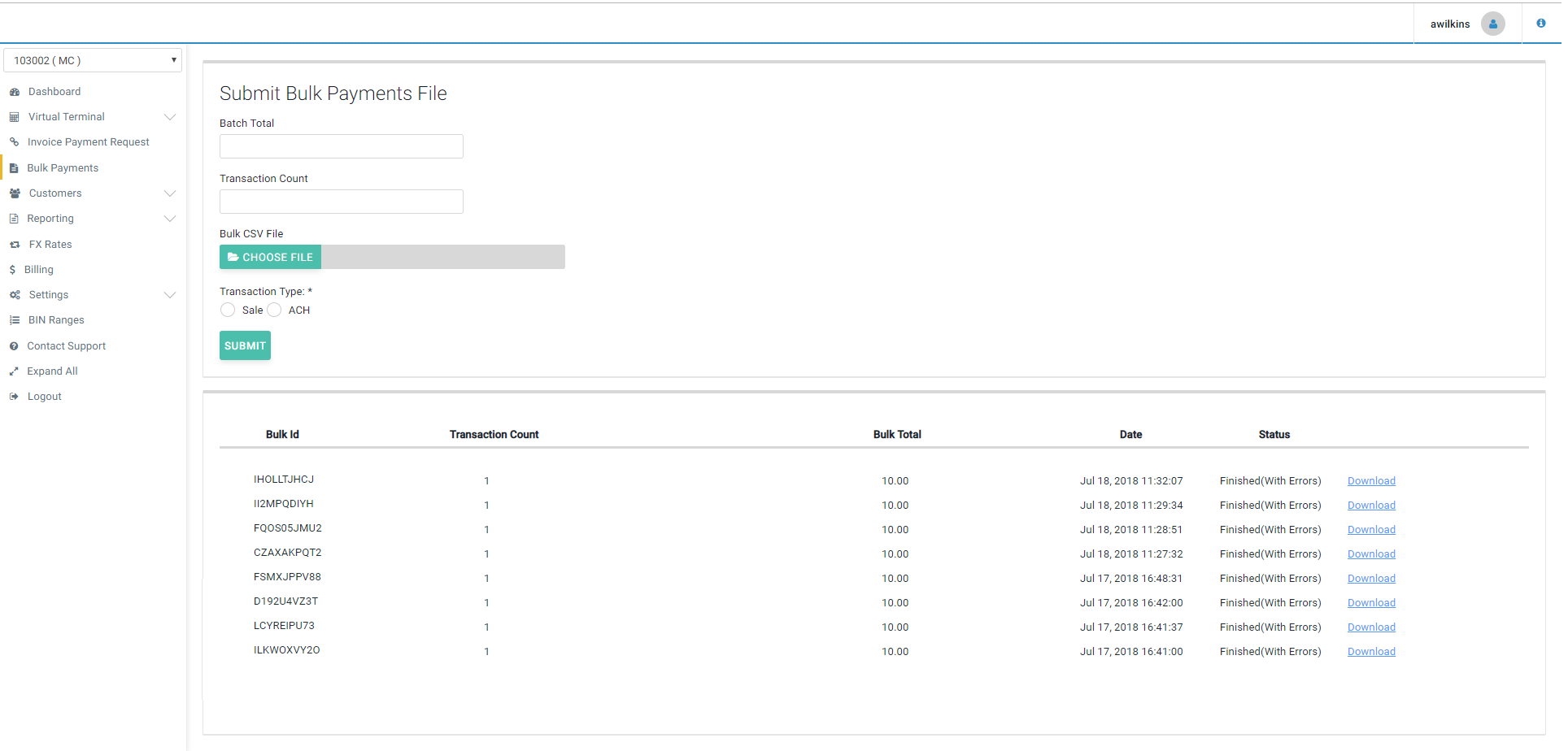Bulk Payments
The Bulk Payments feature provides merchants with the ability to upload a CSV file of transactions for processing. This is especially useful in cases where a merchant does not process transactions one by one or a large volume of transactions need to be processed at one time.

Understanding the fields:
- Batch Total: The total value of the transactions present in the CSV file.
- Transaction Count: The quantity of transactions present in the CSV file.
- Batch CSV File: The CSV file used to submit the transactions for processing.
- Transaction Type: The format of transaction submitted for processing. Only the "Sale" transaction type is supported.
In this first part, the user only needs to provide the fields required above and click in SUBMIT. After that, the payment gateway is going to start the processing of the file.
When the file is submitted, if the batch total or the transaction count do not match the CSV file data, or if the file is not a CSV file, or even if the data provided for each transaction in the file is not consistent (wrong hashes for example), an error is generated and the payment gateway does not even starts to process the CSV file.
When the file is successfully submitted, the payment gateway processes the transactions and generate a response file, which is going to be presented on the table under the SUBMIT button.
- Bulk Id: When the file is submitted correctly, a bulkid is generated for that file to define the set of transactions processed from the given file.
- Transaction Count: quantity of transactions present in the file.
- Bulk total: total value for the transactions within the file.
- Date: The date of the submission.
- Status (And Download Link): Status of the processing. When finalized, a status FINISHED appears, alongside a DOWNLOAD button to download the resulting CSV file which contains the processing details of each transaction.
Each time a bulk payment file is submitted, a new line on the results table is added.
About the File Format
The file send by this request needs to be composed by the transactions you want to process. During the processing, each line provided in your file is going to be considered a transaction and each transaction (line) should be represented by the following fields in your CSV file.
FOR SALE TRANSACTIONS
| FIELD NAME | REQUIRED | DESCRIPTION |
|---|---|---|
| ODERID | Y | A unique reference generated by Merchant system to identify the transaction. Maximum of characters. |
| CURRENCY | Y | ISO 4217 Currency Code. |
| AMOUNT | Y | Amount formatted to two decimal places. E.g. 1653.00 |
| CARDNUMBER | Y | Card PAN. If a SECURECARD is used (in CARDTYPE), this field should include the CARDREFERENCE of the given Secure Card. |
| CARDTYPE | Y | Card Type used for the transaction. For more details visit Special Fields and Parameters - Card Types. This field can also include the SECURECARD type, when using a Secure Card to perform the transaction. |
| CARDEXPIRY | N | Expiry date of the card. A 4 digit expiry field (MMYY), required if the CARDTYPE is not SECURECARD. If the CARDTYPE is SECURECARD this field should be left blank. |
| CARDHOLDERNAME | N | The cardholders name. Required if the CARDTYPE is not SECURECARD. If the CARDTYPE is SECURECARD this field should be left blank. |
| ADDRESS1 | N | AVS Address Line 1. |
| ADDRESS2 | N | AVS Address Line 2. |
| POSTCODE | N | AVS Post Code. |
| DATETIME | Y | Format: DD-MM-YYYY:HH:MM:SS:SSS. |
| HASH | Y | A HASH code formed by part of the request fields. Take a look at ND003 - Hash Formation For Transactions on Bulk File for more details. |
| AUTOREADY | N | Set to Y for setting auto ready or N to mark as pending. |
| DESCRIPTION | N | Optional transaction description. |
| N | Card holder email for notification. |
If you omit fields that are NOT REQUIRED in your transactions, make sure to include the comma separating your omitted field(s) from the next one. Processing will occur on the order of transaction fields in the CSV file based on the order presented above. If commas are missing (or you include them in the wrong sequence), processing will fail.
Also, each transaction of your CSV file also contains a HASH and they also should follow a formation rule.
The general rule to build HASH field is given at the Special Fields and Parameters section. For this specific feature, you should use the following format:
TERMINALID:ODERID:AMOUNT:DATETIME:SECRET